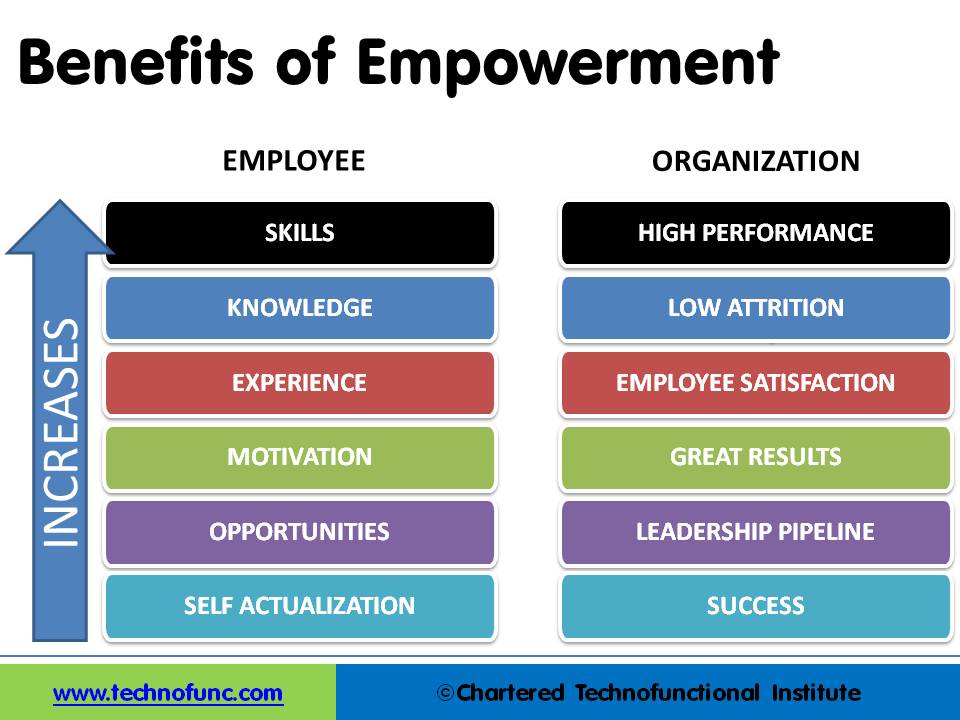- Home
- Business Processes
- Industry Knowledge
- Aerospace Industry
- Automotive Industry
- Banking Domain
- BFSI Industry
- Consumer/ FMCG Industry
- Chemicals Industry
- Engineering & Construction
- Energy Industry
- Education Domain
- Finance Domain
- Hospitality Domain
- Healthcare Industry
- Insurance Domain
- Retail Industry
- Travel and Tourism Domain
- Telecom Industry
- Leadership Skills
- eLearning
- Home
- Leadership Skills
- Team Leadership
- Benefits of Empowerment
Benefits of Empowerment
Teams are certainly very relevant and important elements in today’s high-performance organization but the important thing to remember as a leader is that we can’t simply rely on putting highly effective individuals together to make a highly effective team. Empowerment increases the effectiveness of the team and drives many intangible benefits both for the organization and the employees.
Effective teams often require the right mix of people, skills, resources, and a focus on building good working relationships. Empowering your team members allows leaders to utilize the skills, knowledge, experience and motivation of their entire talent base. Let’s understand how to empower your team members to achieve great wins!
What is Empowerment?
Empowerment is the authority or power given to someone to do something. Empowerment refers to the delegation of some authority and responsibility to employees and involving them in the decision-making process, not in mere job activities, but rather at all the levels of management. Empowered employees develop loyalty and trust and they are proud to be working for the company and are eager to contribute to company success. People can be “empowered” to make decisions at work. They can be “empowered” to speak up with new ideas. Employees can also be “empowered” to act when the integrity of the organization is at stake.
Benefits to the Employee
Empowerment provides new opportunities to your team members to develop and stretch beyond their current capabilities and acquire new skills. It helps in increasing their motivation level, creates new opportunities to develop their leadership skills and satisfy their self-actualization needs. Empowered employees have increased self-confidence, are keen to develop their own skills, and also to find ways to make use of those skills to the company's benefit.
It brings a sense of ownership to the employee due to which he personalizes the goals and objectives of the organization and associates his success with his own abilities. Also, the performance of the employee improves as he attaches self-induced rewards with his performance by making decisions pertaining to the problem and sees the results (success) that follow.

Benefits to the Organization
On the other hand, it brings immense benefits to the organization and to the project or the program. Performance increases, people feel more satisfied and there is low attrition. You can achieve great results and exposure builds the leadership pipeline for your organization. Empowerment is all about mutual success where everyone wins.
Empowerment increases the organization’s responsiveness towards the problems or issues. Also, there is an increase in the productivity of an employee as he is completely engaged with the firm and takes decisions for the betterment of the organization as a whole. The benefits are numerous and well-documented — happier, more productive employees, a higher level of engagement, enhanced customer service, reduced stress, increased innovation, more pride and loyalty, less stagnancy, and an organization that is more adaptable to change. Plus, it just makes the workplace more pleasant for everyone.
Empowering your team is not difficult, but it does require a conscious effort. A tremendous shift in thinking is required by both leaders and professionals to make empowerment work.
Related Links
You May Also Like
-
Building Perfect Creative Team
One misconception around creativity is that creative act is essentially solitary. Most of the world's important inventions resulted not from the work of one lone genius, but from collaboration of a team with complementary skills. Managers should build teams with the ideal mix of traits to form a creative group and then establish the conditions that make creativity much more likely to occur.
-
Time management is the process of planning and exercising conscious control of time spent on specific activities, especially to increase effectiveness, efficiency, and productivity. The best time management techniques improve the ways you work. Time management refers to managing time effectively so that the right time is allocated to the right activity. Learn more about the five steps for effective time management viz. study, identify, analyze, decide, and implement.
-
Reasons behind Wastage of Time
Under-utilization of time may be due to the faulty system or faults of manager/officer/leader or due to lack of planning. There could be many factors driving the procrastination behavior like system issues, personal work habits, and lack of delegation, personality traits, and bad working habits of the leader, failure to tackle interpersonal conflicts, obstacles, and lack of far-sightedness.
-
Benefits of Teams in Workplace
The use of formal work teams is commonplace in modern organizations. But why we have teams? What are the benefits or advantages that teams provide for organizations and employees? Do we really need to adopt formal team structures and use team-building approaches in organizations? Read this article to explore and learn the benefits of having formal teams in organizations.
-
Teams are part of the modern organizational culture. Whether you are a team leader or a team member, having a better understanding of how teams work, and being able to identify where the team is in the process, is a critical part of ensuring the team is ultimately successful. Start with the basics and understand what a team is and what role they play in an organization.
-
In today's innovation-driven economy, understanding how to generate great ideas has become an urgent managerial priority. Managers need to encourage and champion ideas and need to help their organizations incorporate diverse perspectives, which spur creative insights and facilitate creative collaboration by harnessing new technologies. Innovation is the embodiment, combination, and/or synthesis of knowledge in original, relevant, valued new products, processes, or services.
-
Narrative leadership is interpreted as the leader who aspires to construct leadership by telling stories. Leadership is a task of persuasion, of winning people’s minds and hearts. Storytelling is thus inherently suited for the task of leadership. Learn about the narrative leadership style and how to use this style to inspire and motivate followers or to manage change.
-
Teams are certainly very relevant and important elements in today’s high-performance organization but the important thing to remember as a leader is that we can’t simply rely on putting highly effective individuals together to make a highly effective team. Empowerment increases the effectiveness of the team and drives many intangible benefits both for the organization and the employees.
-
Evidence of the medically damaging symptoms of work stress necessitates applying the treatment of stress management. Stress management is increasingly drawing the attention to the management experts not only as a remedial measure but also as a way to resource management. If the workplace can be made a little more lovable the increase in the achievement of the organization may be much time more. If group stress can be removed by introducing group discussions and recreational facilities a long-lasting team spirit may get developed.
-
This style is characterized by leaders making decisions for others and expecting followers to follow instructions. The directive leader is adept at giving instructions, setting expectations, and establishing timelines and performance standards. However, it is possible for the same leaders to display both directive and supportive behavior as per the demands of the situation.
Explore Our Free Training Articles or
Sign Up to Start With Our eLearning Courses

About Us
Learning
© 2023 TechnoFunc, All Rights Reserved










